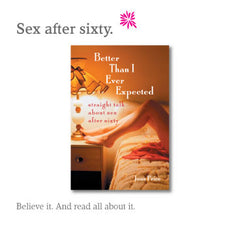That sounds like a bad riddle, right? Like one I heard on NPR last week: What goes up a hill and down a hill but doesn’t move? The answer to that one is a road. And the answer to what subtracts more than it adds is sex.
 Here’s the disturbing—but not, when I think about it, surprising—statistic I ran across this week, courtesy of colleague Sheryl A. Kingsberg, a PhD and chief of the Division of Behavioral Medicine at the University Hospitals Case Medical Center: “When sex is good, it adds 15 to 20 percent additional value to a relationship. When sex is bad or nonexistent, it plays in inordinately powerful role draining the relationship of positive value—about 50 to 70 percent!” I was so struck by that statistical picture, I’m on the trail of the original research to understand more. But in the meantime, what I know from other studies—and my own experience and conversations with women—suggests that’s about right.
Here’s the disturbing—but not, when I think about it, surprising—statistic I ran across this week, courtesy of colleague Sheryl A. Kingsberg, a PhD and chief of the Division of Behavioral Medicine at the University Hospitals Case Medical Center: “When sex is good, it adds 15 to 20 percent additional value to a relationship. When sex is bad or nonexistent, it plays in inordinately powerful role draining the relationship of positive value—about 50 to 70 percent!” I was so struck by that statistical picture, I’m on the trail of the original research to understand more. But in the meantime, what I know from other studies—and my own experience and conversations with women—suggests that’s about right.
Let me first say that good sex doesn’t automatically make a relationship good. And a good, loving relationship doesn’t automatically mean that the sex will be good. But if I think back to a study done a couple of years ago, “The Components of Optimal Sexuality,” I’m reminded of how many of the characteristics of good sex are also characteristics of good relationships. I won’t revisit the whole list, because you can read the series of detailed blog posts we did on each of the components. But here are just a few that come to mind in this context:
- Being present. It’s so easy to take our partners (and, of course, others in our lives) for granted. Truly paying attention to one another—today—is a great gift.
- Connection. When we feel connected to our partners, intimacy comes naturally (especially when we’re overcoming obstacles together). If you’re feeling “together but alone,” there are steps you can take.
- Authenticity. At this point in our lives, I find that many of us are more willing than ever to own what we think and feel. Whether we’re in longstanding or new relationships, this helps us to be ourselves—and to be open about what we like and need, in the bedroom and the rest of life.
- Vulnerability. Having sex is perhaps the ultimate act of making yourselves vulnerable to each other. What a reinforcement of the bond that a couple has with each other!
 Dr. Barb DePree, M.D., has been a gynecologist and women’s health provider for almost 30 years and a menopause care specialist for the past ten.
Dr. Barb DePree, M.D., has been a gynecologist and women’s health provider for almost 30 years and a menopause care specialist for the past ten.


0 comments